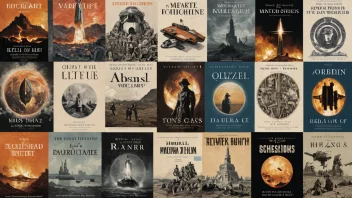Existentialism, a philosophical inquiry into the nature of existence, individual experience, and the search for meaning, has significantly shaped modern literature. Authors who delve into existential themes often grapple with profound questions about life, death, freedom, and the human condition. This article explores some of the bestselling books that not only entertain but also provoke thought and reflection on existential issues, providing readers with insight into the complexities of existence.
Understanding Existentialism in Literature
Before we dive into specific titles, it’s essential to understand what existentialism entails. Rooted in the philosophy of figures like Søren Kierkegaard and Friedrich Nietzsche, existentialism emphasizes individual existence, freedom, and choice. Unlike traditional philosophical approaches that seek universal truths, existentialists argue that meaning is subjective and must be constructed by the individual.
In literature, this manifests through characters who confront life’s absurdities, face moral dilemmas, and navigate the often chaotic nature of human experience. These themes resonate deeply with readers, making existential literature both compelling and relatable.
Key Existential Themes in Bestselling Books
Several existential themes recur in literature, providing fertile ground for storytelling. Here are some of the most prominent:
- The Absurd: The conflict between humans’ desire to find inherent meaning in life and the indifferent universe.
- Freedom and Choice: The weight of personal responsibility and the consequences of individual decisions.
- Isolation and Alienation: Feelings of disconnection from society and self.
- Death and Mortality: The inevitability of death and its implications on how we live our lives.
- Authenticity: The pursuit of an authentic life in a world filled with societal expectations.
Bestselling Existential Novels
1. "The Stranger" by Albert Camus
One of the quintessential existentialist novels, The Stranger tells the story of Meursault, a man who is emotionally detached from the world around him. Through his indifferent reaction to his mother’s death and the subsequent murder of an Arab man, Camus explores the absurdity of existence and the concept of existential freedom. The novel challenges readers to consider the consequences of living without societal norms and the inherent meaninglessness of life.
2. "The Unbearable Lightness of Being" by Milan Kundera
Kundera’s novel intertwines the lives of four characters against the backdrop of 1968 Prague. Through the lens of existential philosophy, he examines the idea of lightness versus weight, questioning the significance of choices made in life. The characters grapple with love, fidelity, and the search for meaning amid political turmoil, making this a profound exploration of existence.
3. "No Exit" by Jean-Paul Sartre
This play, while not a traditional novel, encapsulates existential themes in a compelling format. The characters find themselves in a room in hell, forced to confront their past actions and the reality of their existence. Sartre famously states, "Hell is other people," emphasizing the role of interpersonal relationships in shaping our identity and existence.
4. "The Bell Jar" by Sylvia Plath
Plath’s semi-autobiographical novel follows Esther Greenwood, a young woman struggling with her identity and mental health. Through Esther’s descent into depression and her existential crisis, Plath addresses the theme of isolation and the societal pressures faced by women. The novel is a poignant exploration of the search for self in a world that often feels alienating.
5. "The Road" by Cormac McCarthy
In a post-apocalyptic setting, McCarthy's The Road follows a father and son navigating a desolate landscape. The novel grapples with themes of survival, love, and the human spirit in the face of despair. Through their journey, McCarthy raises profound questions about existence, morality, and the essence of what it means to be human.
Bestselling Non-Fiction Books on Existential Themes
1. "Man's Search for Meaning" by Viktor E. Frankl
Frankl, a Holocaust survivor, presents a powerful narrative that combines his experiences in concentration camps with insights from his psychotherapeutic practice. He argues that finding meaning in suffering is essential for survival and lays the groundwork for logotherapy, a therapeutic approach centered around the search for meaning.
2. "The Denial of Death" by Ernest Becker
In this Pulitzer Prize-winning work, Becker examines how the fear of death influences human behavior and culture. He posits that much of human action is a defense against the awareness of mortality, leading to various forms of denial. Becker’s exploration of the death anxiety provides a thought-provoking perspective on existence.
3. "Existentialism is a Humanism" by Jean-Paul Sartre
This foundational text presents Sartre’s existentialist philosophy in a digestible format. He argues for the importance of individual freedom and responsibility, asserting that existence precedes essence. Sartre’s work invites readers to embrace their freedom and create their own meaning in life.
Children’s and Young Adult Literature with Existential Themes
1. "The Little Prince" by Antoine de Saint-Exupéry
This beloved children’s book transcends age, imparting profound insights on love, loss, and the nature of relationships. Through the journey of the Little Prince, readers are encouraged to reflect on what truly matters in life, emphasizing the importance of seeing with the heart rather than the eyes.
2. "The Perks of Being a Wallflower" by Stephen Chbosky
This coming-of-age novel explores themes of mental health, identity, and the quest for belonging. Through Charlie’s letters, readers witness his struggles with trauma and the search for meaning amidst adolescence’s chaos. Chbosky’s novel resonates with young adults grappling with existential questions about their place in the world.
Literary Trends: The Rise of Existential Literature
In recent years, there has been a resurgence of interest in existential themes within contemporary literature. Authors are increasingly exploring the complexities of human existence, often through the lens of modern issues such as technology, climate change, and social alienation. This trend reflects a societal desire to grapple with the uncertainties of modern life and the quest for meaning in a rapidly changing world.
Conclusion
Existential themes in literature provide a rich tapestry for exploring the human condition. From the absurdity of existence to the search for meaning, bestselling books that delve into these themes invite readers to reflect on their own lives and experiences. As we navigate a world filled with uncertainties, these literary works remind us of the enduring power of storytelling to illuminate our understanding of existence.






